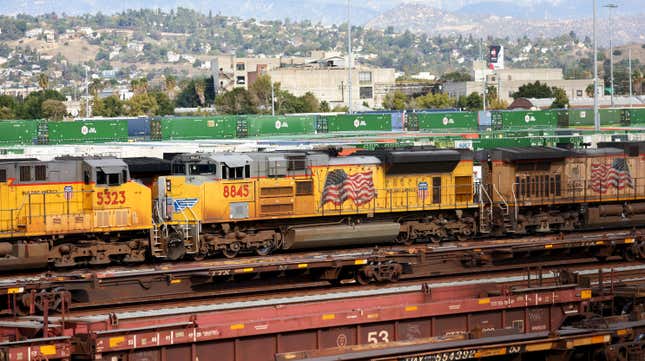
One of the largest rail unions in the US has turned down the agreement meant to find a compromise between workers and employers.
Yesterday (Nov. 21), several members of the Transportation Division of the International Association of Sheet Metal, Air, Rail, and Transportation Workers (SMART-TD) narrowly voted to reject the Sept. 15 national rail agreement. The same day, SMART-TD’s yardmasters and another union, the Brotherhood of Locomotive Engineers and Trainmen (BLET), ratified the agreement.
So far, four of the 12 freight rail unions have rejected the Biden administration’s deal–which offers a 24% raise, an additional $5,000 in bonuses, one additional day of paid leave, and higher health insurance—while the other eight have approved it. The sticking point for those voting down is not pay or bonuses: it’s about work rules and quality of life issues, such as staffing levels and sick pay, which the tentative agreements leave out.
SMART-TD’s rejection kicked off a cooling off period until Dec. 8, where its workers will maintain status quo on the job as the union continues bargaining with the National Carriers’ Conference Committee (NCCC). In the event of an impasse, the trade union will be eligible to strike starting Dec. 9. And it’s not just the 28,000 conductors, brakemen, yardmen, engine service employees, and yardmasters, represented by SMART-TD that’ll stop work then. All unions, regardless of how they voted, will join the picket line if even one union decides to protest.
“We stood shoulder to shoulder with our brothers and sisters in SMART-TD and others in rail labor throughout this process, and we will continue to stand in solidarity with them as we approach the finish line in this round of negotiations,” said BLET president Dennis Pierce.
As the US grapples with 40-year-high inflation and squeezed supply chains, a rail strike would be a massive blow. The holiday gifts may have hit the shelves already, but perishables like food, utilities and fuel, as well as e-commerce deliveries, all hang in the balance.
Charted: How SMART-TD members voted
Quotable: Rail strikes would cripple US supply chains
“The backup into ports could reignite acute port congestion that we’ve seen. The parcel market, like UPS, you’ll have that impacted, as well. There would be a lot of pressure on the truck market. And with that shortened capacity, prices would increase.” —Jess Dankert, vice president for supply chain at Retail Industry Leaders Association, the group represents more than 200 major retailers
Rail strike, by the digits
12: The rail unions that must approve their deals to prevent a strike
115,000: Workers represented by the 12 unions
30%: Nation’s freight carried by rail
322: Business groups that wrote to Biden to make sure all the deals go through because a rail shutdown would cripple all parts of the US economy
$2 billion: The estimated daily impact of a railway lockout
$2.8 billion: Hit to the chemical cargo moved weekly, according to the American Chemistry Council (ACC)
700,000: Jobs the economy stands to lose during the first half of 2023 if the strike lasts one month, as per ACC
$156 billion: Loss to GDP if the strikes last a month, ACC estimates
4%: How much the producer price index would jump in the event of a month-long rail strike, according to ACC. If the strike lasts two months, it’ll jump 12%
Can Congress stop rail workers from striking?
Much to the chagrin of unions, several spooked industry players and politicians, from the Association of American Railroads to labor secretary Marty Walsh, are calling upon Congress to intervene.
Since Biden already played his emergency board card earlier this year, Congress is the last resort in the event of a stalemate. Under the 1926 Railway Labor Act, Congress has the authority to intervene in rail labor disputes with action, like extending the cooling-off period or forcing an unratified deal for both sides, to avert a strike.
During the last rail strike over 30 years ago, in 1991, Congress forced a settlement within 24 hours.
Related stories
🤝 Unions reach a tentative deal, averting major rail strike
🤼♂️ Are unions responsible for the decline of unions?
🍋 Supply chain problems are getting worse, not better, for US food retailers